Allergy Friendly Plants: Tips For Making Gardens Allergy Friendly

Plant pollen is for sure any allergy sufferer's worst enemy. Gardening, or even enjoying a garden, is the farthest thing from their minds. However, with a little planning and research, it is possible for people allergic to garden plants to create and enjoy anti-allergy gardens all season long. Let's learn more about how to make an allergy friendly garden.
How to Make an Allergy Friendly Garden
Every year, as spring brings forth new life in the garden, people begin to sneeze in response to pollen in the air. For pollen sensitive people and those allergic to garden plants, spring is an uncomfortable and agonizing time of year. The key to making gardens allergy friendly lies in selecting plants with low pollen. Contrary to popular belief, low pollen plants are not bland or unattractive. Bees, butterflies, and other insects pollinate allergy friendly plants, not the wind. These plants tend to have large, bright-colored and pretty flowers and are a lovely addition to any garden. Wind-pollinated plants should be avoided and generally have small, inconspicuous flowers, hanging blooms, or catkins.
Allergy Friendly Plants
Choosing allergy friendly plants is a great way to enjoy all the benefits of gardening without the sneezing or sniffling associated with being allergic to garden plants. There are several allergy free alternatives you can use in the garden. Trees- Trees with showy flowers are preferred in anti-allergy gardens. The following low or no allergen trees include:
Shrubs- Shrubs to include in your allergy friendly garden may consist of the following:
Flowers- Many herbaceous plants are deemed to be okay for use as allergy friendly plants and include:
Allergy-Friendly Garden Tips
In addition to making gardens allergy friendly, it is important to pay attention to air quality and overall pollen count. Do not go outside on days when the pollen count is extremely high. No matter how allergy friendly your garden is, high pollen count days will make anyone with allergies miserable. Likewise, it is best not to garden on days when the wind is strong. Cool, wet days also help keep pollen levels low. It helps to avoid trees and shrubs while they are in bloom and absent of leaves or are beginning to grow. Wearing lightweight clothing that covers your arms and legs, as well as a hat and sunglasses, provides protection from flying pollen. If your garden is surrounded by grass, be sure to keep the grass cut very low to inhibit seeds. Wetting down grass before gardening, or edging your garden area with stones will help keep allergens at bay too. Molds produced from composts and decomposing mulch can also affect those suffering from allergies. Therefore, you should consider buying finished compost rather than making your own and replace organic mulches (like bark, shredded leaves, etc.) with pebbles or a similar material. If you are allergic to garden plants but want to garden, don't let the thought of pollen keep you from enjoying all the benefits that gardening has to offer. With careful planning and low-allergy plants, you can learn how to make an allergy friendly garden that will ease all your springtime anxieties.
Gardening tips, videos, info and more delivered right to your inbox!
Sign up for the Gardening Know How newsletter today and receive a free download of our most popular eBook "How to Grow Delicious Tomatoes."
-
 10 Best Apartment Plants To Turn Your Small Space Into An Oasis
10 Best Apartment Plants To Turn Your Small Space Into An OasisThe best apartment plants can lend an ambience of the tropics, brighten up a space, or add a touch of drama, and turn an apartment into a relaxing oasis.
By Amy Grant
-
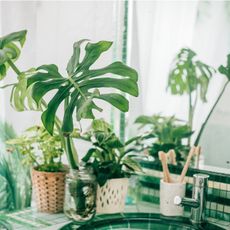 Grow a Bathroom Oasis: 8 Best Bathroom Plants With No Light or Low Light
Grow a Bathroom Oasis: 8 Best Bathroom Plants With No Light or Low LightSome apartment dwellers grow the best bathroom plants with no light or low light. Read how one of our favorite plant lovers does it in the big city.
By Teo Spengler
-
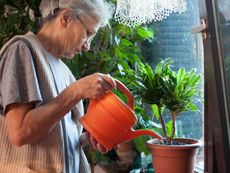 Seniors And Houseplants: Indoor Senior Gardening Ideas
Seniors And Houseplants: Indoor Senior Gardening IdeasIndoor gardening for seniors can help with depression, stress, and loneliness, especially while social distancing. Here are ideas.
By Mary H. Dyer
-
 Psychiatric Health Garden – Designing Gardens For Mental Health Patients
Psychiatric Health Garden – Designing Gardens For Mental Health PatientsClose your eyes and imagine yourself sitting in your dream garden. Does this visualization make you feel calm and relaxed? This is the concept behind planting gardens for mental health. Learn more about garden therapy and psychiatric health gardens in this article.
By Darcy Larum
-
 Healing Garden Ideas – How To Make A Healing Garden
Healing Garden Ideas – How To Make A Healing GardenEven gardens filled with nothing but ornamental plants can have some medicinal and healing value – a collection of plants meant to soothe and heal the mind and body are known as healing gardens. Click here for some healing garden ideas to help get you started.
By Darcy Larum
-
 What Is A Memory Garden: Gardens For People With Alzheimer’s And Dementia
What Is A Memory Garden: Gardens For People With Alzheimer’s And DementiaPeople with dementia or Alzheimer's disease will glean a host of positive experiences from participating in the garden. Designing a memory garden allows them to enjoy exercise and fresh air as well as stimulate the senses. Learn more in this article.
By Bonnie L. Grant
-
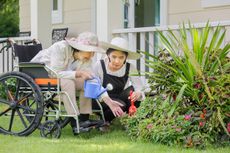 Hospice Garden Ideas – Learn About Gardens And Hospice Care
Hospice Garden Ideas – Learn About Gardens And Hospice CareBecause of their therapeutic benefits, gardens for those in hospice care are often incorporated into the facility. What is a hospice garden? Click here to find out about the relationship between gardens and hospice and how to design a hospice garden.
By Amy Grant
-
 Senior Home Garden Activities: Gardening Activities For The Elderly
Senior Home Garden Activities: Gardening Activities For The ElderlyMore senior home garden activities are being offered to elderly residents of retirement homes and nursing homes, and even to patients with dementia or Alzheimer's. Click here to learn more about gardening activities for the elderly.
By Teo Spengler
-
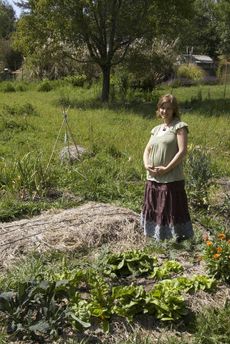 Gardening While Pregnant: Is It Safe To Garden When Pregnant
Gardening While Pregnant: Is It Safe To Garden When PregnantGardening while pregnant is an enjoyable way to get the exercise you need to stay healthy during pregnancy, but this form of exercise isn't without risk. Learn more about gardening during pregnancy in this article.
By Jackie Carroll
-
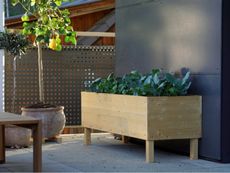 Table Garden Design: How To Build Table Garden Boxes
Table Garden Design: How To Build Table Garden BoxesWhen gardening becomes difficult, either through growing older or due to a disability, it may be time for a table garden design in the landscape. This article can help with that. Click here to learn more.
By Susan Patterson